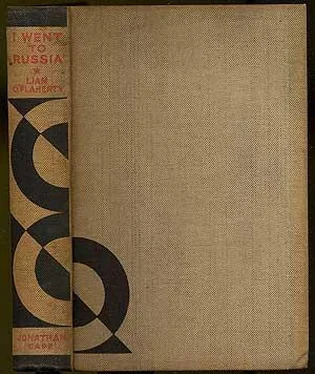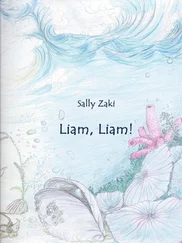‘Thank you,’ he said. ‘I will taste your drink without swallowing it. It is not my custom to drink on board ship. Please understand also that I am an apprentice officer.’
‘It doesn’t matter a damn what you are, my boy,’ I answered. ‘The great thing in this world is to be a Man. Understand that and you are all right with me.’
But the painted lad, with the patent leather shoes and the wig, did not feel inclined to become a man, even though he was nearly twice my size. He had the same bee in his bonnet as the mate. He was afraid of something. After a few tiresome remarks he left my cabin. So did the steward, after he had fetched me another bottle of brandy. I was drinking rather freely through sheer boredom and irritation. I got to my feet and seized my bottle.
‘Armed with this bottle,’ I cried, TU make a tour of the ship, in the hope of finding somewhere a free man who is willing to drink or to talk with me, somebody who is neither a grovelling slave nor oppressed by a vague fear of something I cannot understand. I am beginning to get afraid of this ship.’
I sallied forth into the corridor. We were going down the river, but I felt sure that we were already in the open sea under heavy weather, by the way the walls of the corridor and the deck seemed to sway and threaten me. Undoubtedly the brandy was not to be trifled with. I reached the mess room, entered and tottered to a seat, in a way that was not at all impressive. Four or five officers were already sitting there.
‘Have a drink,’ I cried.
One of them pointed to a samovar that lay on the centre of the table.
‘We have already got a drink’ he said laughingly. ‘There is tea.’
‘Have some brandy instead,’ I cried. ‘Tea is for women.’
‘So?’ he said, still laughing. ‘On your ships it is the custom for crew to drink at sea? Yes? With us, no. Crew drink. Then maybe ship sinks and passenger is drowned. You drink. We sail ship. Very good. Good luck.’
I could just barely see his laughing, boyish face, but I could hear that he was a good fellow and a man. And I was properly put to shame. So I rose and bowed and said:
‘Thanks comrade. Good night.’
Taking my bottle, I returned to my cabin. There I pitched it out through the porthole, sobered with an effort and said to myself:
‘I am like the Greek who fouled the toga of the Roman envoy, or like a jester in a holy place. This is my first contact with the greatest force in modern history, the Russian Revolution, and I come to it with vine leaves in my hair. It is easy to jest about these people, just as easy as it is to jest about Christ, or make fun of a child’s intellect. But it is obvious that these Bolshevik seafarers are apostles of Communism just as sincerely as Christ’s fishermen were apostles of Christianity. I must approach them with respect.’
Then I went on deck and walked about the ship and listened and I felt a mysterious influence crowding in upon me. It was not real, but the crystallisation of my thoughts, all I knew about this Revolution, all it had meant to me in my hot youth, when revolt is imperative and romantic, together with all it meant to the later development of my intellect, when reason, settling down to manhood, thinks calmly on a re-arrangement of man’s relation to the universe and to all that is still unknown of the universe.
I saw the ship riding in the darkness, with the red flag of Communism fluttering at her stern, not as a trader, going from shore to shore with goods, but as a courier, bringing this wild message of social salvation from the East to all the toiling masses of the world, as Christ’s apostles brought salvation to the slaves of Rome’s great Empire. Now I saw this ship in the abstract, as a real fragment of that terrifying phenomenon which has engrossed the mind of humanity for the past twelve years. It was all round me. I had stepped into it, almost as a fly is caught in a spider’s web, or as a foolish swimmer is gathered in a current of the sea, engulfed and carried headlong among the violent rumours of the deep.
The individuals I had met had also been engulfed and were carried along. That is why they looked like slaves, judging them from a European standpoint, whose criterion is the individual and not the mass. In this immense force, of which the ship was a unit, there were no individuals, just drops in an ocean, grains of sand in a desert, cogs in a machine. The crew was a Soviet. The ship was a machine. I felt humble, smaller infinitely than this force which surrounded me, just as infinitely as I felt superior to the individual Bolsheviks I had met. It was the mass of the Bolshevik machine that was terrifying in its power, encroaching on Europe like an outrageous colossus, rude, barbarous, yet beautiful, like a great mountain in the morning light.
As I watched and listened, the idea both attracted and repelled me. I love power whether in the individual or in the state. Rome, Britain, Genghiz Khan, Napoleon or Shakespeare, they are all equally beautiful. But I like to hold apart from a power greater than myself.
And then, standing alone there in the night, I said to myself:
‘I loathe the multitude, except as a spectacle to be watched, an ant-hill on the march, a horde of tribesmen moving across plains, a city’s mob in riot; all watched from a mound, or an upper window, or in the pages of a history book. I can only love this Revolution from afar, as a spectacle to be watched. I am an individual of Western Europe. I am proud of my individuality and proud of my intellect. For the first time, I realise that these people are come to overthrow us and are inventing specious philosophies in order that we may lay down our arms and allow ourselves to be overthrown without a struggle. Now they are looting our brains, looting our workshops for our inventions, looting our libraries and our universities and our museums for the revelations of our intellect. To-morrow they shall come with fire and sword to annihilate our power, when their barbaric strength has been harnessed to our knowledge and become unconquerable. I feel that Europe is doomed. Yet I will to remain with it and be destroyed rather than ally myself with this alien power, which has an alien, myriad-headed God, a clinging monster, belching smoke, made of steel, brutal, without the refined, singing beauty that can alone satisfy my soul/
I started. Somebody called out on the bridge in a strange language, a deep voice, full of power, menacing.
I almost fled to my cabin.
Chapter II. I Make Friends With The Crew
I Awoke late. Through the porthole I could hear the lashing of the sea against the ship’s sides. While I dressed I had to sway with the movement of the deck. That was good. I love the sea. My mind grew calm. The sea drove out the fears and melancholy speculations of the previous night. The revolution was no longer a monster, with a sickle in one hand and a hammer in the other, come to smash our statues and burn our libraries, and rip our pictures from their frames, and raze our cities and organise us all as human cogs in a machine of monastic regularity. Ho! The ancient sea! The same old sea that carried Agamemnon, Raleigh and myself, with the same utter indifference, an undying testimony to the unchangeability of nature and to man’s powerlessness to destroy the earth’s beauty. Ho! Ho! All fanaticism dies and does not even leave a stench on the salt sea's surface. There she rolls the same as ever.
I strolled towards the mess room in search of food and to continue my investigation of Bolshevik life. The room was empty. Through an open slide I could see a pretty wench washing dishes in the galley. Also a jolly cook or two, smoking cigarettes. I winked at the girl. She giggled and closed the slide. In a moment it opened again a little, and two wenches tried to get a look at me, the first one and her mate. Yes. Not only the sea is unchangeable but the women also, those blessed beings whose bodily comeliness makes them proof against the brooding fanaticism of man, the maker of gods.
Читать дальше












